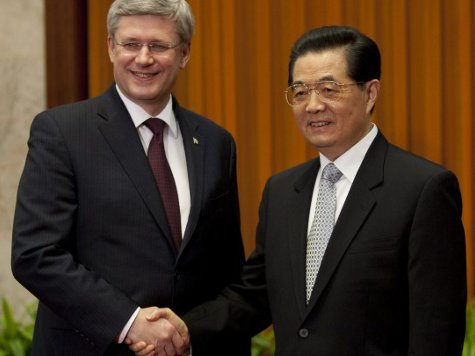
Solyndra is no longer the administration’s biggest energy blunder. Canadian Prime Minister Stephen Harper appeared a think tank event held in Washington yesterday. During an interview Harper explained that President Obama’s rejection of the Keystone pipeline had forced Canada to change course in ways that will permanently affect Canada’s approach to its own energy market:
In a public one-on-one interview here with Jane Harman, head of the Wilson Centre think-tank, Harper said Obama’s rejection of the controversial pipeline — even temporarily — stressed Canada’s need to find other buyers for oilsands crude.
And that wouldn’t change even if the president’s mind did.
“Look, the very fact that a ‘no’ could even be said underscores to our country that we must diversify our energy export markets,” Harper told Harman in front of a live audience of businesspeople, scholars, diplomats, and journalists.
In other words, there is no undoing the damage inflicted by the decision to stop the Keystone project. Prime Minister Harper touched on this a couple times during the exchange. The entire thing can be viewed at the Wilson Center website. Here’s a bit of Harper’s statement on Keystone:
Harper: Now, in fairness though I’ve got to say that Canada’s interests here are a little bit different. And particularly, I might as well be frank, particularly in light of the…of the interim decision at least on Keystone. What it really has highlighted for Canada is that our issue when it comes to energy and energy security is not North American self-sufficiency. Our energy [issue] is the necessity of diversifying our energy export markets. We can not be, as a country, in a situation where really our one, and in many cases almost only, energy partner could say no to our energy products. We just cannot be in that kind of position.
And the truth of the matter is that, when it comes to oil in particular, we do face a significant discount on the marketplace because of the fact that we’re a captive supplier. We have made it clear to the people of Canada, one of our national priorities is to make sure that we have the infrastructure and the capacity to export our energy products outside of North America.
That last part is significant. What Harper is saying is that Canada could make more money by creating a market for its oil rather than selling all of it solely to the US. In other words, the cost of Canadian oil will go up as the US is forced to compete with China. Prime Minister Harper returned to this issue during the Q&A saying, clarifying that this new direction was irrevocable:
Harper: In terms of the second part of your question, would approval of this change our mind, uh, the answer is no. Look, the very fact that a “no” could even be said underscores to our country that we must diversify our energy export markets. But as I say we have taken a significant price hit by virtue of the fact that we’re a captive supplier and that just does not make sense in terms of the broader interest of the Canadian economy.
Obama could have approved the pipeline, added 30,000 jobs to the economy, and insured the most secure oil source for our future. Instead, he chose to kill the pipeline and the jobs and, in the process, insured that America will pay more for the oil it does buy. It’s hard to imagine a worse decision, especially since it was all so Obama could deny Republicans a win in the run-up to the next election.

COMMENTS
Please let us know if you're having issues with commenting.